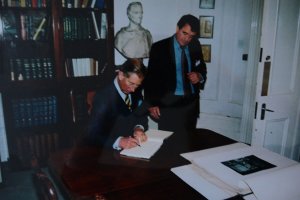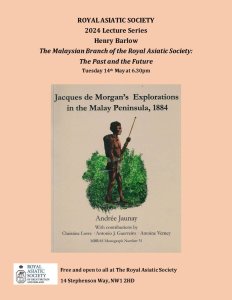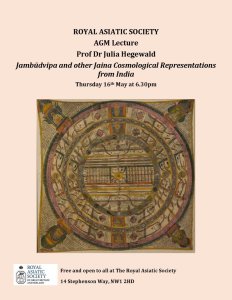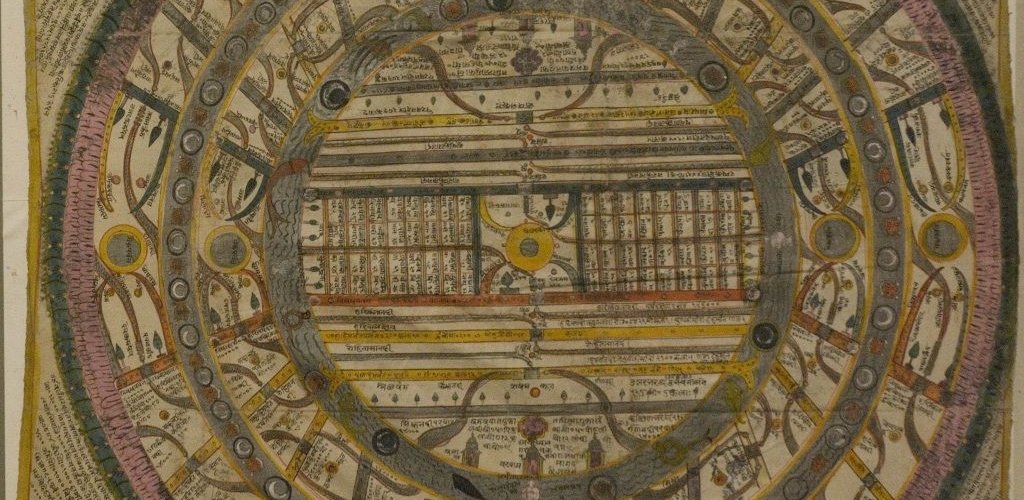King Charles III remains our Patron
We are pleased to be able to announce King Charles III has agreed to continue to be the Society’s Patron. We are grateful to be able to continue our royal patronage, first given by George IV in 1824. The King’s letter arrived this week and marks not only his first anniversary of the King’s coronation but also the bicentenary of the Society’s patronage.

~ ~ ~ ~ ~
With our new archive catalogue now fully operational, it has been a pleasure to continue cataloguing our collections and therefore making them more accessible to researchers. Last week three small collections were catalogued. The first of these were the newly acquired papers of Derek Davis, who died in 2023, which were catalogued by one of our volunteers, Matt McKenzie. We are grateful to Derek’s widow, Diana, for donating the papers and some of his library to the Society. Derek, after retiring from the Civil Service, became much involved in the Society, bringing his experience and interests, serving on the Council and Committees and contributing to the Journal. Derek had spent time in India before going to Oxford University. In 1965 he travelled with his university friend, Christopher Bayly on an overland trek to India and back, an unexpected result being that Bayly changed his research subject to South Asian history. Many years later, Derek was also instrumental in establishing the Society’s Bayly Prize in honour of Professor Sir Christopher Bayly. Besides, a lifelong interest in India, Derek also loved Russian history and literature and particularly that of Pushkin. The papers donated to the Society concern Derek’s research into and translation of Pushkin’s A Journey to Arzrum during the Campaign of 1829 which became a supplement to the Journal in 2022. For scholars interested in this material, the catalogue can be found here.

The other two collections catalogued were both small special collections. The first was for four rubbings of the Inscription from the Nestorian Stele, China. The stele, erected in 781, documents 150 years of early Christianity in China. It is a limestone block 279 centimetres (9 ft 2 in) high with text in both Chinese and Syriac describing the existence of Christian communities in several cities in northern China. The rubbings, copies of the original ones, were donated to the Society in 2018 by Jacob Ghazarian, a medieval Near East scholar, and were purchased by him in 2006. The second Special Collection caught my attention. I like to write poetry, so I was intrigued to discover this collection of rhymed sonnets on the 99 names of God. Unfortunately there is no identifying material as to who wrote these, but they were a competent poet. I pondered on them being written by Arthur J. Arberry, an Arabic scholar who translated many Arabic poems. But when I compared the handwriting of these sonnets with those of a letter written by him, also in our collections, they were so dissimilar, I knew that couldn’t be true. So, at present, their author remains a mystery, but hopefully by getting them catalogued there may be an increased chance of somebody being able to recognise the poet.

This week saw a further catalogue going live. This one I’ve been working on for a few weeks and it is for the James George Roche Forlong Fund. James Forlong was born in Lanarkshire, Scotland. He joined the Indian Army in 1843, being appointed to the Engineering Staff, Madras Presidency, in 1847. In 1852 he was appointed as an Engineer in the army based in Myanmar (Burma) and was responsible for creating a road across the mountains from Rahkine State (Arakan) to the Irrawaddy. Through 1858-9 he travelled extensively in Egypt, Palestine, Syria, Turkey, Greece, Italy and Spain. In late 1859 he was appointed a Special Commissioner and Inspector-General of Prisons for the Andaman Islands and Myanmar. His engineering skills took him to Kolkata (1861-20), Darjeeling (1863), the North West Provinces (1864-7), Rajput (1868-71), and Oudh (1872-6). He retired in 1877 and then concentrated on writing on comparative religions. His major works were “Rivers of Life” (1883) and “Faiths of Man: A Cyclopaedia of Religions” which was published posthumously in 1906. He died at home in 1904.
Before dying he created his will in which he bequeathed money to the Royal Asiatic Society to come to the Society upon the death of his wife. The money was to be used towards the establishment of an ‘Imperial Oriental College or School’ and in particular for the promotion of lectures. This fund was to be administered by the Royal Asiatic Society. With the opening of the School of Oriental Studies, London (later SOAS), it was necessary to negotiate with the School about the use of the Fund. The papers I catalogued consist of administrative documents and correspondence concerned with both the inauguration of the Forlong Fund and its continuing application for lectures and scholarships. Part of the Fund has always been used for publications but the administrative documents and correspondence concerning the publications undertaken will be catalogued with the Society’s publication records.

I am currently working on the catalogue for the ‘Catalogues and Handlists’ of our Collections – this is a relatively large catalogue and therefore it will take sometime to complete. I usually have one larger one running alongside smaller ones, so I’ve begun to assess the papers for the Denis Sinor Medal for Near Eastern Studies and I have a couple more special collections from the same box as the previous two awaiting my attention.
~ ~ ~ ~ ~
Yesterday evening, we celebrated Rustaveli Day 2024 with the British Georgian Society. After introductions from the Director of the British Georgian Society, David Gigauri, and our own Director Alison Ohta, a packed lecture theatre was treated to two lectures. The first, by Professor Anthony Eastmond from the Courtauld Institute, examined the life of Queen Tamar and other ‘strong’ women in thirteenth century Georgian history. This was followed by Professor Donald Rayfield from Queen Mary, University of London, who spoke on the women of the Bagrationi dynasty. Afterwards the audience enjoyed Georgian wine and snacks.



This coming week sees two very special lectures at the Society. On Tuesday 14 May, 6.30 pm, we are delighted to welcome Henry Barlow, Honorary Treasurer of the Malaysian Branch of the Royal Asiatic Society. He will lecture on the history of the Branch since its foundation in 1874. This is part of our special bicentenary lecture series involving lecturers from our sister societies.

Our Anniversary General Meeting will be on Thursday 16th May, 5.30pm, and we would encourage as many Fellows as possible to attend. Though this part of the meeting is only open to Fellows it will be followed at 6.30 pm by a lecture which is open to all. This year we are pleased to welcome Professor Dr Julia Hegewald (one of the Fellows featured in our Extraordinary Endeavours Bicentenary Exhibition) who will lecture on “Jambūdvīpa and other Jaina Cosmological Representations from India”. The Jambūdvīpa in our Collections is at present hung in the Council Room and will be available to view.

Both events will also be able to view online. Please contact Matty Bradley (mb@royalasiaticsociety.org) for the necessary links.

